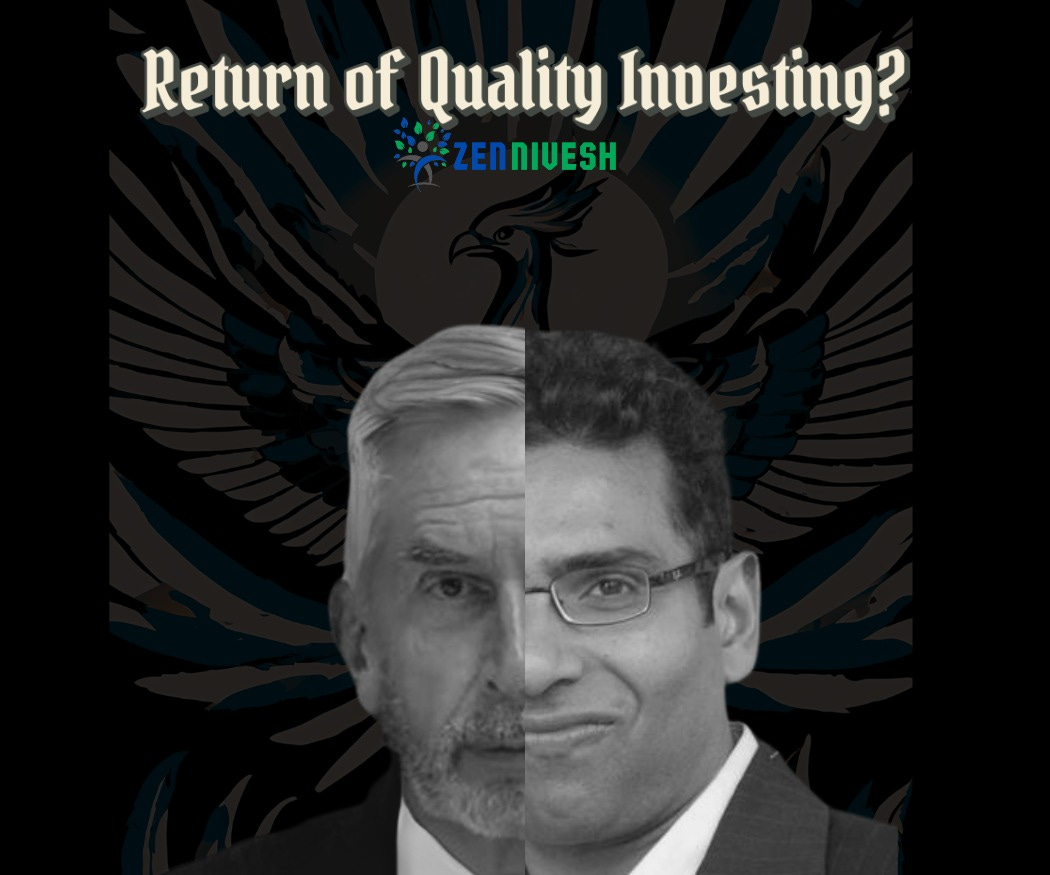There is an old saying in investing. It goes something like this:
During euphoric times, the market doesn’t make a top until the last standing bearish guy throws in the towel and “BUY”.
Similarly, during bearish times, the market doesn’t make a bottom until the last standing bullish guy throws in the towel and “SELL”.
Something similar happened a month ago in the field of quality investing. Before I proceed, for the uninitiated, quality investing is nothing but investing in quality business. So what happened a month ago? This.
Source: Moneycontrol
This news came just a day after Marcellus Investment Managers released a note on portfolio performance and an update on fundamentals. I would like you to focus on this part first.
Source: Marcellus Note 12th March 2025
So, as I shared at the start, arguably the biggest proponent of investing in quality business at any price finally accepts the reality that valuation matters.
And make no mistake. I do not belong to the camp that keeps making fun of Mr. Saurabh Mukherjea because of the poor performance of his fund. I am just a curious investor, trying to look at everything with a fresh pair of eyes. And hopefully, learn something from it.
This, along with a few other reasons, makes me believe that we are probably at the cusp of a new bull market for quality businesses. But before I get to the other reasons, let us look at another investor who has been a big proponent of investing only in quality businesses. I am talking about the popular fund manager, Mr. Terry Smith of Fundsmith LLP. However, there is one big difference between Mr. Smith’s style and Mr. Mukherjea's. Smith’s investing style can be compressed into three small sentences.
Invest in Good Companies
Don’t Overpay
Do Nothing
You will find enough literature on it on the internet, so I would not go into it in depth. I would, however, recommend that you read the Owner’s Manual of Fundsmith to appreciate the finer nuances of Terry Smith’s investing style and Fundsmith’s investing process.
Yet to my shock, I saw this.
Source: Stockopedia
In the case of SM, you could say that, probably, valuation discipline was missing. However, you can’t say the same for TS. TS always follows the principle of not overpaying.
But why did this happen?
You have to time-travel with me to find the answer to this question.
Let’s go 12 years back, to 2013.
Prof Sanjay Bakshi drops one of his best pieces on investing in your inbox.
And he gives several examples of why holding good quality businesses for a long time, even at a seemingly higher valuation, makes a lot of sense. You can read the whole blog here.
For the moment, however, let’s focus on the key takeaways shared by Prof Bakshi at the end of the blog.
If 2013 was the year when quality businesses were looking expensive, they looked even more expensive in 2014. Progressively, more in 2015, 2016, 2017, 2018, 2019, & 2020.
But trees don’t grow to the sky. At some point, they stop and take a breather. That has been the story of quality businesses in the period 2020-2025.
However, picture this. There were 4 Cr demat accounts before COVID. Today, there are 20 Cr demat accounts. A 5x increase. The new 16 Cr demat accounts have only witnessed the ugly side of investing in quality. And what has made the most money in the last 5 years?
Turnaround stories
Government-push sectors
Mean-reversion stories
Special situation stories
Statistically, cheap stocks that become fairly valued or overvalued.
Public memory is very short. Forget about the new investors. Even the seasoned ones have stopped discussing quality businesses.
My humble suggestion to anyone, therefore, is to pay good attention to quality businesses.
And while you focus on quality businesses, it doesn’t mean you go back to the same ITC, Nestle, Asian Paints, etc. Some of them are no longer a quality business. And in case of some, the valuation comfort is still not there.
But the quality universe is pretty large. Enough for you and me to hunt for new ideas at a decent valuation, if not mouth-watering.
The only question is:
“Are You Watching Closely?”
Watch this 150-second video.
If you have trouble watching, here is the transcript of the same.
“Every great magic trick consists of three parts or acts. The first part is called "The Pledge". The magician shows you something ordinary: a deck of cards, a bird or a man. He shows you this object. The second act is called "The Turn". The magician takes the ordinary something and makes it do something extraordinary. Now you're looking for the secret... but you won't find it, because of course you're not really looking. You don't really want to know. You want to be fooled. But you wouldn't clap yet. Because making something disappear isn't enough; you have to bring it back. That's why every magic trick has a third act, the hardest part, the part we call "The Prestige".”
Quality businesses, in my view, have gone through the first two parts.
Pledge, where the quality stocks were presented to you by the magicians.
Turn, where the market made these quality businesses disappear from investors’ portfolios.
But I guess we are not too far from the third act, the hardest part, the part we call “The Prestige”, where the market will bring those quality stocks back to the forefront.
Are you watching closely?












While I agree that owning Quality Business will never go out of style but can it be that the overall nature of the stock market has changed (post Covid) because of various reasons (including awareness, knowledge and usage of AI in making decisions) ..then is it a possibility that overall behaviour of the market has changed irreversibly and we have to operate/accept the current high and abnormal valuation and that this is the 'new Quality' and it will be futile to look any further